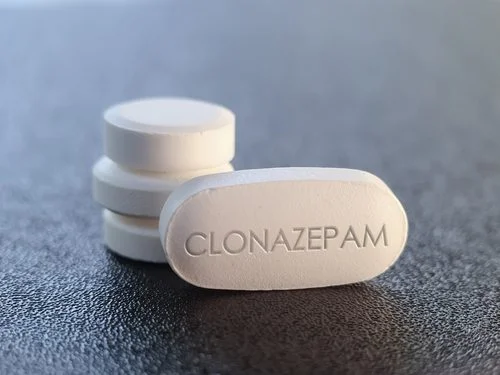Klonopin (Clonazepam)
Clonazepam is a benzodiazepine drug that is used to control seizures and to treat panic attacks.

Common Brand Names: Klonopin, Rivotril
Since the mid-1970s, clonazepam has been used to treat anxiety and seizures, and its success in doing so explains its widespread use today. It belongs to the Schedule IV category of substances under the federal drug scheduling system, meaning that its clinical application is recognized and the likelihood of developing dependence on it is relatively lower compared to other scheduled substances. However, long-term misuse of the substance can result in dependence and the development of withdrawal symptoms, and it can also lead to addiction.
Legitimate Uses of Clonazepam
The use of clonazepam and other benzodiazepines are widely prescribed for the treatment of and the control of symptoms of the following conditions:
- Generalized anxiety disorder
- Social anxiety disorder
- Panic disorder
- Avoidant personality disorder
- Muscle spasms
- Epileptic seizures
- Alcohol withdrawal
- Sleep disorders
- Pre-surgical anxiety
- Parasomnia
- Sleeping pill withdrawal
- Mania
- Discomfort from electroconvulsive therapy
- Bruxism/tooth grinding
How Do People Abuse Clonazepam?
Individuals seeking to misuse clonazepam frequently consume it in the following ways:
- Taking more of the drug than prescribed
- Taking the drug more frequently than recommended by a physician
- Crushing and snorting the tablets
- Diluting the powderized tablets, then injecting them
- Combining it with alcohol for a powerful synergistic effect.
These routes of administration are used to heighten the effects of the drug, reduce the waiting time for its effects, or both. However, these expose the user to a number of unexpected and potentially negative effects.
Clonazepam Interactions
Clonazepam can interact with certain drugs in unintended and undesirable ways. These include:
- Antifungal medications: These can prevent the metabolization of clonazepam in the central nervous system (CNS), resulting in unwanted high concentrations of the drug.
- Antiepileptic medications: These can reduce the effectiveness of clonazepam.
- Antihistamines: These can induce a drowsy or sleepy state on their own and are likely to exaggerate the effects of clonazepam.
- Narcotic and opioid pain medications: These can create additional CNS depressant effects on top of what clonazepam already creates.
Clonazepam Side Effects
In the short term, those who take clonazepam will experience both physical and mental relaxation, as well as the following side effects of using clonazepam:
- Drowsiness
- Loss of balance
- Slurred speech/stuttering
- Loss of appetite
- Loss of libido
- Depression
- Fatigue
- Migraines
- Frequent urination
- Memory loss
- Detachment
- Vertigo
- Confusion
- Dry mouth
- Constipation
- Diarrhea
- Vomiting
Long-Term Effects of Clonazepam
Clonazepam is generally considered a safe medication as long as it is used as prescribed. However, misuse of the drug can result in some unwanted effects, including:
- Clonazepam or benzodiazepine addiction
- Withdrawal symptoms
- Panic attacks
- Weight gain
- Depression
- Paranoia
Clonazepam Overdose Symptoms
Overdosing on clonazepam can cause the following immediate effects:
- Drowsiness
- Confusion
- Labored breathing
- Coma
An overdose constitutes a medical emergency. Call 911 or seek help immediately if an overdose is suspected.
Signs of a Clonazepam Addiction
The Diagnostic and Statistical Manual of Mental Disorders, Fifth Edition (DSM-5) lists 11 criteria for substance use disorders, including the following:
- Using clonazepam in larger amounts or for longer than directed
- Wanting to cut down or stop using clonazepam but being unable to
- Spending a lot of time to get, use, or recover from clonazepam use
- Experiencing strong cravings for clonazepam
- Inability to manage commitments due to clonazepam use
- Continuing to use clonazepam, even when it causes problems in relationships
- Giving up important activities because of clonazepam use
- Continuing to use clonazepam, even when it puts you in danger
- Continuing to use clonazepam, even when physical or psychological problems may be made worse by use
- Increased tolerance to clonazepam
- Experiencing clonazepam withdrawal symptoms when you abruptly quit
Clonazepam Withdrawal Symptoms
Withdrawal from benzodiazepine addiction typically presents with the following symptoms:
- Sleep disturbances
- Irritability and mood swings
- Tension
- Anxiety or panic attacks
- Suicidal thoughts
Long-term users of clonazepam who abruptly stop taking it are likely to experience some or all of these. To prevent these, a detoxification period is necessary, and is often followed or supported by replacement drug therapy.
Detoxification from Clonazepam
Long-term Clonazepam users will often be prescribed progressively lower doses of benzodiazepines, up until a point that they can safely stop. After some time their bodies will then expel all traces of clonazepam from their body. Patients have to be monitored closely throughout this process, as improper detoxification from clonazepam can lead to negative outcomes.
If you’re dealing with withdrawal symptoms, a medical detox facility can help. Their dedicated staff can provide you with 24/7 supportive care that may involve giving you IV fluids, nutritional supplements, and symptomatic drugs. These interventions are aimed at helping you remain as safe and as comfortable as possible as you go through the worst of withdrawal.
Finding Treatment for Clonazepam Addiction
In almost all cases, individuals who are addicted to clonazepam will undergo counseling and behavioral therapy to address the root causes of their drug misuse and to help them address the psychiatric causes of drug-seeking behavior.
It’s worth noting that while most rehab centers offer counseling and therapy, they do not always offer the same programs nor the same emphasis on each form of treatment. Some may emphasize some forms of treatment such as 12-step programs or behavioral therapy while excluding others. Other rehab centers and programs may also offer alternative or supplemental therapies such as art, yoga, or motivational therapy. In both cases, these treatment modalities will typically be delivered on either an outpatient or inpatient basis.
- Outpatient clonazepam addiction treatment: If you are considered lower risk and are deemed more likely to adhere to the treatment plan without supervision, you may be eligible for outpatient treatment. This way, you will be allowed to continue living at home, but will be expected to regularly attend therapy and counseling at a treatment center. You will also have more freedom in deciding on your daily activities. If you want, you can continue to go to work or school and enjoy most parts of your everyday life.
- Inpatient clonazepam addiction treatment: Patients who are severely addicted to clonazepam or other substances will likely need to undergo inpatient treatment. If this is deemed appropriate for you, you will be required to live at the treatment facility, and your daily activities will be strictly monitored and planned around your various treatment modalities as determined by your primary care physician.
Every case of substance use disorder is unique and some individuals respond better to certain treatments or treatment combinations than others. Make sure to check with your attending doctor to find out which programs are right for you.
Get the Treatment You Deserve
Better Addiction Care represents programs that have a proven history of providing safe and comfortable treatment for individuals who are suffering from the long-term side effects of clonazepam. We can work with your private insurance to get you the cost-effective care that you need, and our team of recovery specialists will be able to quickly match you to the right treatment facility for you.
Give us a call at (800) 429-7690 to speak to a recovery support advisor. They will help verify your insurance and find a treatment program that’s right for you. And even if you don’t have insurance, there are still many financing options available to you to ensure you get the care you need.
A Short History of Clonazepam
Clonazepam was developed in the early 1960s, finally being patented in 1964 by the Hoffman La Roche pharmaceutical company. During this time, benzodiazepines such as clonazepam were starting to replace barbiturates as a sedative of choice, chiefly due to their comparatively lower addiction risk. The brand of clonazepam called Klonopin became available in 1975 specifically to control epilepsy.
Unfortunately, as with other benzodiazepines, taking clonazepam can be habit-forming, as it was soon discovered that tolerance could be built up with only a few weeks of regular use. However, prescriptions for clonazepam only continued to gradually increase with time as it and other benzodiazepine drugs became used more and more to treat a wider variety of medical conditions.
The wider medical use of clonazepam has opened up opportunities for those that don’t need it to misuse it. Clonazepam and other benzodiazepines soon became more and more popular for recreational use as well. While it’s unusual for patients prescribed with clonazepam to develop a use disorder if they take it as prescribed, the risk is always present.
By the 2000s, the misuse of clonazepam and other benzodiazepines started to take the public spotlight as an emerging epidemic problem. The National Institute of Drug Abuse reported deaths from benzodiazepines rising by over 400% between 2002 and 2015, causing alarm in their widespread misuse.






